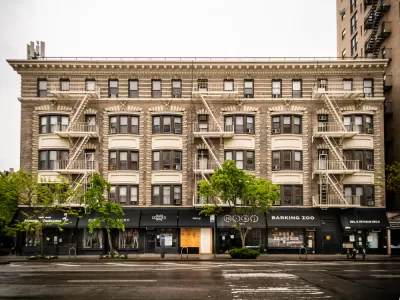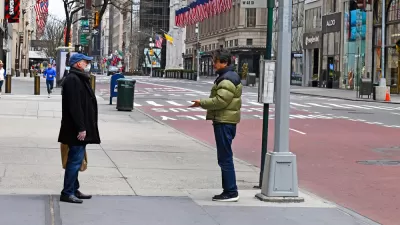A new study finds that county density is not significantly related to the infection rate, but higher density counties have significantly lower virus-related mortality rates than those with lower densities, possibly due to superior health care.

Problem, research strategy, and findings: The impact of density on emerging highly contagious infectious diseases has rarely been studied. In theory, dense areas lead to more face-to-face interaction among residents, which makes them potential hotspots for the rapid spread of pandemics. On the other hand, dense areas may have better access to health care facilities and greater implementation of social distancing policies and practices. The current COVID-19 pandemic is a perfect case study to investigate these relationships.
A new study by researchers Does Density Aggravate the COVID-19 Pandemic?, published in the Journal of the American Planning Association, uses sophisticated modeling to account for both direct and indirect impacts of density on the COVID-19 infection and mortality rates for 913 U.S. metropolitan counties, controlling for key confounding factors. The results indicate that larger metropolitan areas have higher infection and mortality rates, but after controlling for metropolitan population size, county density is not significantly related to the infection rate, and higher density counties have significantly lower virus-related mortality rates than do those with lower densities, possibly due to superior health care systems.
Takeaway for practice: These findings suggest that connectivity matters more than density in the spread of the COVID-19 pandemic. Large metropolitan areas with a higher number of counties tightly linked together through economic, social, and commuting relationships are the most vulnerable to the pandemic outbreaks. They are more likely to exchange tourists and business people within themselves and with other parts, thus increasing the risk of cross-border infections. This study concludes with a key recommendation that planners continue to advocate dense development for a host of reasons, including lower death rates due to infectious diseases like COVID-19.
FULL STORY: Does Density Aggravate the COVID-19 Pandemic? Early Findings and Lessons for Planners

Alabama: Trump Terminates Settlements for Black Communities Harmed By Raw Sewage
Trump deemed the landmark civil rights agreement “illegal DEI and environmental justice policy.”

Planetizen Federal Action Tracker
A weekly monitor of how Trump’s orders and actions are impacting planners and planning in America.

The 120 Year Old Tiny Home Villages That Sheltered San Francisco’s Earthquake Refugees
More than a century ago, San Francisco mobilized to house thousands of residents displaced by the 1906 earthquake. Could their strategy offer a model for the present?

In Both Crashes and Crime, Public Transportation is Far Safer than Driving
Contrary to popular assumptions, public transportation has far lower crash and crime rates than automobile travel. For safer communities, improve and encourage transit travel.

Report: Zoning Reforms Should Complement Nashville’s Ambitious Transit Plan
Without reform, restrictive zoning codes will limit the impact of the city’s planned transit expansion and could exclude some of the residents who depend on transit the most.

Judge Orders Release of Frozen IRA, IIJA Funding
The decision is a victory for environmental groups who charged that freezing funds for critical infrastructure and disaster response programs caused “real and irreparable harm” to communities.
Urban Design for Planners 1: Software Tools
This six-course series explores essential urban design concepts using open source software and equips planners with the tools they need to participate fully in the urban design process.
Planning for Universal Design
Learn the tools for implementing Universal Design in planning regulations.
Clanton & Associates, Inc.
Jessamine County Fiscal Court
Institute for Housing and Urban Development Studies (IHS)
City of Grandview
Harvard GSD Executive Education
Toledo-Lucas County Plan Commissions
Salt Lake City
NYU Wagner Graduate School of Public Service





























